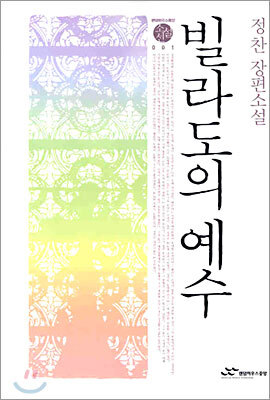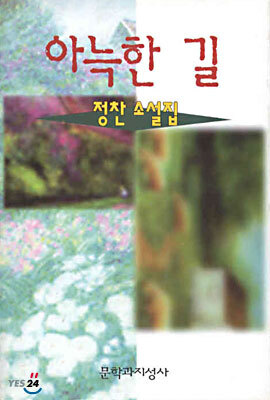Jung Chan (born 1953) is a South Korean writer.
Life
Jung Chan was born in Busan in 1953. He graduated from Seoul National University with a degree in Korean education in 1974. Jung began his writing career in 1983 when his novella Marui tap (말의 탑 The Tower of Language) was published in World of Language. Over a prolific career, he has authored such works as the novels Sesangui jeonyeok (세상의 저녁 Evening of the World), Hwanggeum sadari (황금사다리 The Golden Ladder), Rodemnamu araeseo (로뎀나무 아래서 Under the Rodem Tree) and the short story collections Gieogui gang (기억의 강 The River of Memory), Wanjeonhan yeonghon (완전한 영혼 A Perfect Soul), and Beniseueseo jukda (베니스에서 죽다 Death in Venice). His novel Billadoui yesu (빌라도의 예수 Pilate's Jesus) and his short story collection Aneukan gil (아늑한 길 A Cozy Path) have been translated in English. He is the recipient of the 1995 Dong-in Literary Award for "Seulpeumui norae" (슬픔의 노래 Song of Sadness) and the 2003 Dongseo Literary Award for "Beniseueseo jukda."
Writing
The novels of Jung Chan are a testimony to the human history of pain and misery, set against the historical, cultural, and ideological backgrounds of modern Korean society in the 80's and 90's. His works have consistently striven to probe into the origins of this universal suffering and its resulting wounds.[1] Jung was profoundly influenced by the Gwangju Uprising, which occurred while he was working as a reporter for the Dong-a Ilbo. What intrigued Jung was not so much the political issue, but the issues of men confronting death and redemption. In Wanjeonhan yeonghon, the barbarity of those in power is contrasted against the simplicity and passivity of innocent souls.
Another concern in Jung's work is the relationship between power and language. The power here is the end product of the corruption of language or language turned ideological. Jung's "Eoreumui jip" (얼음의 집 Ice House) and "Seulpeumui norae" offer a careful meditation upon the language of novels, and "Suribueongi" (수리부엉이Eagle-Owl) focuses on the tension between God's silence and the language of corrupt power. In "Eoreumui jip," what the powerful pursue so relentlessly is ultimately identified as the place of God. While delving into the interchange between the essence and the manifestations of essence, Jung also investigates the problem of fictional language revealed in the novel itself. For this reason, his work is often seen as occupying a middle ground between poetics and novels.
More recently, Jung has tackled the issue of time and memory. According to Jung, time that moves along a straight line allows history to be divided into fragments which can then be forgotten piecemeal, and thereby undermines the very state of existence. Wrestling against such destructive qualities inherent in the flow of time, Jung has reimagined the concept of time in a variety of manners. "Siinui sigan" (시인의 시간 Poet's Time) utilizes the tension between the forward movement of time and the backward movement of memory to search for the possibility of redemption in memory.
References
[1] Korean Literature Today. Volume 4, No.3, Fall, 1999. http://anthony.sogang.ac.kr/klt/99fall/chongchan.htm
Jong Chan wurde 1953 in Busan unter dem Namen Jong Chan-dong geboren und absolvierte sein Studium der Didaktik der Koreanischen Sprache an der pädagogischen Fakultät der Seoul National University. Er begann seine schriftstellerische Laufbahn mit der Veröffentlichung seiner Erzählung Der Turm der Sprache in der Literaturzeitschrift „Onoeu Saege“ (Die Welt der Sprache). Nach seinem Debüt setzte er sich vorwiegend und intensiv mit der Welt des Bewusstseins wie z. B. der Beziehung zwischen dem Menschen und der Macht bzw. der Frage nach der Erlösung und Gott auseinander.
Jeong Chan fue muy influenciado por el Levantamiento de Gwangju, que ocurrió mientras trabajaba como periodista para el periódico Dong-a Ilbo. Lo que le intrigó no fue el tema político, sino el de personas enfrentándose a la muerte y la redención.6 En "Alma perfecta" (Wanjeonhan yeonghon), la barbarie de las personas en el poder contrasta con la simplicidad y la pasividad de las almas inocentes.7 Otra de sus preocupaciones es la relación entre el poder y el lenguaje. El poder aquí es el producto final de la corrupción del lenguaje o el lenguaje usado en aras de una ideología.8 "Casa de hielo" (Eoreumui jip) y "Canción de la tristeza" (Seulpeumui norae) ofrecen una meditación cuidadosa acerca del lenguaje de las novelas y "Búho" se centra en la tensión entre el silencio de Dios y el lenguaje del poder corrupto.9 En "Casa de hielo" (Eoreumui jip), lo que buscan los poderosos es identificado como el lugar de Dios. Mientras ahonda en el intercambio entre la esencia y las manifestaciones de la esencia, también investiga el problema del lenguaje ficticio que se revela en la misma novela. Por esto, su obra a veces es vista como un campo medio entre la poesía y la novela.
Chan a été profondément influencé par le soulèvement de Gwangju qui s'est produit alors qu'il travaillait en tant que journaliste pour le quotidien Dong-a Ilbo. Ce qui a intrigué Jeong n'était pas tant les questions politiques, mais davantage la question du rapport de l'homme face à la mort et face à la rédemption. Dans Une âme parfaite (Wanjeonhan yeonghon), il évoque la barbarie de ceux qui sont au pouvoir, élément qui entre en contraste avec la simplicité et la passivité des âmes innocentes1.Une autre préoccupation dans le travail de Jeong concerne la relation entre le pouvoir et la langue. Le pouvoir ici est le produit de la corruption de la langue, celle-ci étant utilisée à des fins idéologiques4. Ses romans Maison de glace (Eoreumui jip) et Chanson de tiiristesse (Seulpeumui norae) offrent une méditation attentive sur la langue et se concentrent sur la tension entre le silence de Dieu et la langue corrompue du pouvoir. Dans Maison de glace (Eoreumui jip), ce que les puissants poursuivent sans relâche est finalement identifié comme la volonté de devenir divin1. Tout en explorant ce qui fait essence et ce qui a l'apparence de l'essence, Jeong étudie également le problème de la langue fictive dans le roman lui-même. Ainsi, son travail est souvent considéré comme occupant une position intermédiaire entre la poésie et le roman.
1953年7月3日、釜山広域市に生まれる。1978年、ソウル大学校師範大学国語科を卒業した。1983年、『言語の世界』に中篇小説『말의 탑(言葉の塔)』が当選し、登壇した。現実と小説言語に対する省察を通じて神と人間との関係を探索する一方、虚構と現実を行き来しながら権力と愛の本質を明らかにすることに注力してきた。代表作として光州民主化運動の意味について書いた『슬픔의 노래(悲しみの歌)』と、権力と愛の本質的問題を書いた『황금사다리(黄金はしご)』などがある。
Чон Чхан родился в 1953 году. Окончив университет, он работал репортером в ежедневной газете. Литературный дебют состоялся в 1983 году, когда увидела свет повесть "Башня из слов". Его перу принадлежит ряд сборников рассказов: "Река памяти", "Уютная дорога", "Смерть в Венеции", "Белая и круглая луна", "Две жизни", "Чистый дом". Кроме того, Чон Чхан является автором романов "Вечер мира", "Золотая лестница", "Пустыня", "Иисус Понтия Пилата", "Скиталец", "По ту сторону пути". Лауреат литературной премии им. Ким Донина и литературной премии "Восток-Запад". В настоящее время преподает писательское мастерство в университете. Сборник рассказов "Уютная дорога" (The Cozy Path) переведен на английский язык и издан в 2010 году издательством Stallion Press.
Главная мысль рассказов Чон Чхана сосредоточена на отношениях между Богом и человеком, а также на изучении природы власти и любви. Лучшими произведениями признаны рассказ "Песнь печали", посвященный восстанию 1980 года в городе Кванджу, а также роман "Золотая лестница", поднимающий проблему власти и любви.
郑赞,生于1953年。大学毕业后,当上了一家报社的月刊杂志记者,并于1983年发表了中篇小说——《马之塔》,凭此步入了文坛。他发表了多部小说集(《记忆之河》、 《幽静的路》、《死于威尼斯》、《又白又圆的月亮》、《二人的生涯》、《洁净的家》等),以及长篇小说(《世界的夜晚》、《黄金梯子》、《旷野》、《比拉多的耶稣》、《流浪者》、《路那边》等),并获得了东仁文学奖、东西文学奖等多个各种文学奖项。他目前在一所大学的文艺创作系任教,给学生教授小说课程。他的《幽静的路》(The Cozy Path)已被译成英语,于2010年在Stallion Press出版社出版。
郑赞小说的主题集中阐明上帝与人类的关系、权力与爱情的本质方面。代表作有回顾“5•18 ”民主化运动意义的《悲歌》,以及谈论权力与爱情的本质问题的《黄金梯子》等。
정찬(1953~)은 대한민국의 소설가다.
생애
정찬(본명 정찬동)은 1953년 부산에서 태어났다. 부산고등학교를 거쳐 1978년 서울대학교 사범대학 국어교육과를 졸업하였다. 1978년 《동아일보》 출판국에 입사해 월간지 기자로 일했다. 1983년 무크지 《언어의 세계》에 중편소설 〈말의 탑〉을 발표하면서 작품 활동을 시작했다. 중앙대학교 예술대학원 문예창작학과를 졸업했다. 동의대학교 한국어문학과 교수로 재직했었다.
작품 세계
정찬은 허구와 사실 세계를 넘나들면서 권력과 사랑의 본질을 탐구해왔다. 작가는 신과 인간, 현실과 타락한 언어의 관계, 그리고 폭력에 노출된 인간의 삶을 지속적으로 소설의 주제로 삼고 있다. 작가의 대표작으로는 광주민주화운동의 의미를 되새긴 《슬픔의 노래》(1995)와 권력과 사랑의 본질을 다룬 《황금사다리》(1999, 1991년 《문학과사회》에 발표한 〈얼음의 집〉 개제작)가 있다. 또한 소설에서 사용하는 언어에 대한 지속적인 고민을 통해 현실을 ‘번역하는 소설어’의 타락을 경계하고 있다.
소설집 《완전한 영혼》(1992)은 작가의 세계관과 입장을 드러낸 작품들이 수록되어 있는데, 특히 당대 문단에서 현실권력에 대한 사유를 담은 대표 작품으로 꼽혀왔다.
《광야》(2002)는 ‘1980년 광주 민주화 운동’을 정면으로 다루었다는 점에서 주목을 받았다. 1980년 5월 당시 《동아일보》 출판국 월간지 기자로 일하던 작가는 광주에서 벌어진 참혹한 일을 알게 되었고 소설로 쓸 결심을 하고 자료를 수소문했다. 작가는 광주민주화운동을 소설로 그려내기 위해 다양한 자료를 심도 있게 수집해서 분석했고, 그 자료를 바탕으로 광주민주화운동의 역사적 의미를 깊이 있게 그려 내는데 성공했다. 또한 1980년 광주에서의 죽음의 문제를 종교적 시선으로 고찰한 부분도 이 작품의 또 다른 의미라고 할 수 있다.
한편 작가가 1980년 광주에 대해 그린 작품은 《광야》뿐만이 아니었다. 장편소설인 《슬픔의 노래》는 광주에 계엄군으로 투입된 과거를 가진 인물의 고통 그리고 세속의 권력과 인간의 악, 진정한 선의 의미 등을 소설의 주제로 삼고 있다.
장편소설 《길, 저쪽》(2015)은 출간 전, 출판사의 온라인 매체에 2014년 9월부터 12월까지 연재한 후 출간된 작품이다. 이 소설은 국가권력의 폭력으로 희생된 사람들의 슬픔과 사랑을 다룬 작품이다. 작가는 1970~80년대를 거치며 국가권력에 의해 훼손당한 사람들, 특히 유신정권과 군사독재정권에 의해 희생당하고 죽임을 당한 사람들의 이야기를 다루었다. 하지만 작가는 시대의 비극을 제기하는 것에 그치지 않고, 연대를 통한 사랑이 개인과 공동체의 회복을 가능하게 할 것을 제시했다.
소설집 《새의 시선》(2018)은 2017년 제25회 오영수문학상을 받은 표제작을 비롯하여 모두 일곱 편의 단편을 묶어 출간했다. 시대의 아픔을 정밀한 시선으로 기록하는 작가는 비통한 마음을 다루는 것 뿐 아니라 핍진한 언어로 현실을 재구성해내었다.
장편소설 《발 없는 새》(2022)는 난징학살, 히로시마 원폭, 일본군성노예제, 문화대혁명 등 20세기 아시아 전반에 걸쳐 발생한 폭력의 역사를 성찰하며, 인간에게 진정한 구원이란 무엇인지질문하고 있다. 작가는 역사적인 사실과 허구, 그리고 실존 인물과 가상의 인물을 통해 부조리한 고통을 외면하지 않고 각자의 현실에서 분투하는 사람들을 그리고 있다.
주요 작품
1) 소설집
《기억의 강》, 현암사, 1989.
《완전한 영혼》, 1992(개정판, 2018)
《아늑한 길》, 문학과지성사, 1995.
《수리부엉이》, 현암사, 1989.
《베니스에서 죽다》, 문학과지성사, 2003.
《빌라도의 예수》, 랜덤하우스코리아, 2004.
《희고 둥근 달》, 현대문학, 2006.
《광야》, 문이당, 2002(개정판, 2006).
《두 생애》, 문학과지성사, 2009.
《정결한 집》, 문학과지성사, 2013.
《새의 시선》, 문학과지성사, 2018.
2) 장편소설
《슬픔의 노래》, 조선일보사, 1995.
《세상의 저녁》, 문학동네, 1998.
《로뎀나무 아래서》, 문학과지성사, 1999.
《황금 사다리》, 자유포럼, 1999.
《그림자 영혼》, 세계사, 2000.
《유랑자》, 문학동네, 2012.
《길, 저쪽》, 창비, 2015.
《골짜기에 잠든 자》, 문학동네, 2019.
《발 없는 새》, 창비, 2022.
3) 산문집
《슬픔의 힘을 믿는다》, 교양인, 2020.
수상 내역
1995년 제26회 동인문학상
2003년 제16회 동서문학상
2006년 올해의 예술상
2015년 제32회 요산김정한문학상
2017년 제25회 오영수문학상




